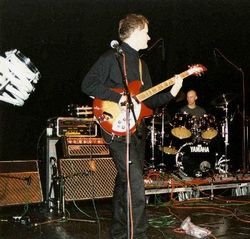
Etcetera started out as a high school band in Aarhaus Denmark, in 1986. It was a group of friends who, inspired by a Jethro Tull concert, decided to start a prog band. Guitar player Frank Carvalho, and Drummer Johnny McCoy were not only founders, but would also prove to be the only consistent members of the band.
Over the years, there were various incarnations. They played the usual gigs, and managed to record some demos. There was even a stint as a cover band called Dr. Robert in '93/'94. In the later '90s, they had finally amassed enough material to record an album. Being that they were not full time musicians (with regular jobs and families), getting the group together took time. This would prove to be a constant problem, and the reason for the band's instability.
The initial two releases were home made affairs. 1999's "Fin de Siecle" was the first proper release. This was followed in 2003, by the album "Tales of Ardour and Deciet." It would prove to be their last, as McCoy finally ended his partnership with Carvalho in 2004.
I got in touch with Frank Carvalho for the Etcetera story.
#######################################################
Your biography has been covered in your ProgArchives profile so let's bypass this and go straight to the bagels.
Please give me your (long or brief) thoughts and lowdowns on.......
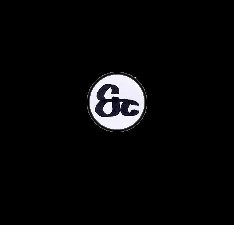
Etcetera from 1998
"Etcetera" and "Dificult Second" really are only collections of demo
recordings. They were and still are made available as a sort of "custom
shop" CDs for anyone interested. The CDs are made by me on demand, and
demand has honestly been pretty limited. If demand was ever higher, I
might have run a proper print batch, but the recording quality really
does not hold up.
"Etcetera" is a collection of songs recorded in 1987-88 (except one song
in 1998). The collection contains songs played by the original Etcetera
of 1986-87. The main songs "Dance of the Daemons" and "Experience" were
recorded by Johnnie and I, with friends, shortly after Etcetera ceased
to play together. We did approach these demos as if it was a proper
recording session, but we did not have neither the means nor the skills
to produce a proper quality recording. Therefore the production sounds
really appauling.
Two more songs were rough live recordings of the original line-up, and
the final song "Endelave" is a 1998 recording, made by Johnnie and I, of
another of the original Etcetera songs.
As everyone knows, the late 1980'ies were a time of great hostility
towards prog. The music of Etcetera was extremely unfashionable, and
eccentric too, so it is no surprise that the original Etcetera never got
a chance to record properly. We did send a few demos around, but to no
reaction. Therefore the home-made quality of the recordings is all there
is.
The music of the original Etcetera was a confusing mix of influences.
Johnnie and I were probably the most stylistically conscious of the lot,
and we often vetoed song suggestions from Michael, when he went too far
out a tangent. But looking back at the music we played back then, this
mix was typical, and a few things stand out as typical for Etcetera:
Jazz and jazz/rock. Anders, and to a lesser extent Johnnie, were into
jazz. I am not a big fan of jazz, but nevertheless everything from that
time seems to have a distinctively jazzy feeling about it. Jazz was very
hip in our circles, which became evident in the music we played. Folk is
another influence on Etcetera music. Jethro Tull is definitely to blame
here, but Michael, the singer and keyboardist was, and still is, into
the folk scene. This influence was also typical for the first Etcetera.
I also have to mention that we had a fifth very early member, Lars
Sĝgaard, who played saxophone and flute, taking the music further into
jazz and folk. The third obvious influence is classic 70'ies prog, and
all my songs tended to pull the music in that direction. Classical music
certainly also played a part. Apart from the mock-Bach section of "Dance
of the Daemons", we made other classic wannabe arrangements. One of
these was later rearranged and appear on "Etcetera" as a break in the
song "Endelave", where it has received an extra
Rick-Wakeman-plays-the-classics twist. Finally we seem to have had a
special fondness for arabic scales. I have no idea why. The song "Camel"
is the prime example.
The early Etcetera was an intense but short lived affair. But all of us
felt, and still feel, very strongly about the music we made together and
those times.
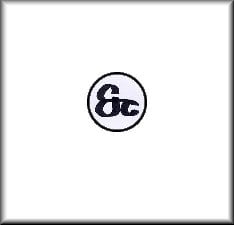
The Difficult Second from 1998
Breaking up the original Etcetera felt like unfinished business to me. I
wanted to improve the prog writing aspect. Anders and I then formed a
new line-up with drummer Jens, and we recorded "The Difficult Second"
with new material. Michael joined in on the session on the vocals. The
recording facilities were the same as on "Etcetera", but I think we had
improved both our playing and our production skills a bit. The sound is
definitely better on this recording, though still demo quality.
(Remember, this was the time when home-recording still required
multi-track tape machines and a bunch of - to us very expensive -
hardware). Unfortunately the multi-track tapes for both the old sessions
are lost. I believe that I could have improved the sound of these
recordings a lot.
The music on "The Difficult Second" went more in the prog direction. But
even so still featured the typical Etcetera traits of jazz, folk and
classical music. The first half of "Trespasser" lacks some direction I
think, but does sound a bit like Peter Bardens-era Camel, or Caravan -
which happens to be very jazzy music too. Then there is a mock-Zeppelin
bridge between the first and last parts. The last part of the song is
where it finds direction. The arrangements here could well be described
to be in the style of early Genesis and PFM. Then there is a couple of
folk songs based on acoustic 12-string. Both were written in the first
Etcetera-era. After this comes "Suite no 1..." which happens to be only
song Anders ever made. I don't know why he never wrote more, because his
arrangement is first-class. The song has two themes. The first theme is
a mellow song, played on the bass over a very nice chord progression.
This piece is again very jazzy, reminiscent of the band "Bruford". Then
a bridge with an unusual chord progreession takes the song into the
second section, which develops into a classical music/prog arrangement
in 7/8. Finally the song returns to the mellow song. The last song is
"Erratic Behaviour". Slightly Mahavishnu, slightly Alan Holdsworth. Not
as good as it was meant to be.
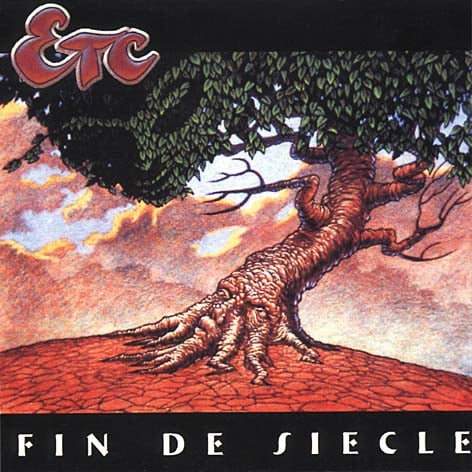
Fin de Siecle from 1999
In 1996 I joined with Johnnie and Anders to record the songs "Anagrams"
and "Gongtric", for a total playing time of 19+ minutes. After that I
suggested to record some more songs, and try to produce a full album.
Anders joined for another song, and Michael both wrote a song and added
vocals to most of the songs. This became "Fin de Siecle", and it was a
virtual reunion of the original Etcetera.
My thoughts on "Fin de Siecle":
"Fin de Siecle" is a more "true" prog album than the older recordings.
"Charles Unhealthy Pïctures" starts out in the big way. A bit ELP'ish.
But in the second half it takes on another direction with a more
jam-like section. This part is more like space-rock and Soft Machine.
"Infinite Chords" is melodic and has soft 12-string playing, and ends
with a more classically-inspired circular chord progression. This song
is in the classic symphonic tradition. "Gongtric" certainly has some
Gentle Giant'esqe ideas thrown in, but then moves into a spacey
direction with a section in 7/8+5/8+5/8+4/8 that is more in the style of
Yes, Gong and the Ozric Tentacles (hence the idea for the song title).
There is a hidden reference to ELP and Mussorsky in the song that no-one
has ever spotted. "Vuggevise" is Michaels beautiful ballad, with Piano,
vocals and a big sounding ending. "Anagrams" is rock-drama with
influences from both classical music and the rock cannon, and is the
only song I have written containing computer generated lyrics. "Absolute
Dance Party III" is a tongue-in-cheek "remix" of pieces from "Dance of
the Daemons".
"Fin de Siecle" is prog in the sense that the music
progresses through a series of changes. There are several melodies in
there, and the arrangement is in the classic prog traditions of Genesis,
PFM and Yes.
I always wanted to use mellotron. On this album I finally got access to
mellotron samples. Better than nothing!
"Fin de Siecle" was fun to make, and I like the overall result,
althought the mix sounds dusty and with little dynamics. We did a lot of
- to me - new things with this album. First it was recorded on a
combination of ADAT-recorders and an Apple Macintosh. The ADAT broke
down at the end of the session, when all the tracks had been recorded,
damaging the timecode track. So a D/A to A/D audio transfer was
necessary. Add to that the consumer grade sound card used on the
Macintosh, and you know why the sound is less than stellar. But again,
this was the pioneering times of hard disc recording. I obviously have
the original multi-track recordings, and could probably remix the whole
affair to great effect.
Another new thing was taking the risk of printing and releasing an album
ourselves. We made a distribution deal with Record Heaven in Sweden. It
was very interesting to be your own record company. Also, the
time-to-market was very short, and it didn't take very long before the
album reached break-even. Releasing your own low-budget albums has
become commonplace now, but was not so much in '98.
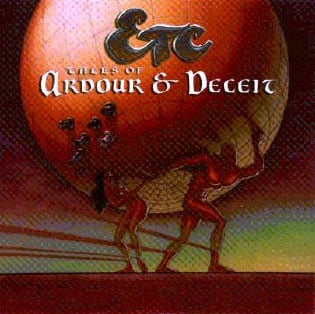
Tales of Ardour & Deceit from 2003
I think it is the best album we made. "Song of Marsk Stig" is an epic
drama with a storyline from the danish middle ages, and may be the best
song I have written. The music is in the vain of both Yes and Van der
Graaf, and there are plenty of odd time signatures. The song goes
through several phases, reflecting the storyline, and the song has
rather hefty dynamic changes. Songs is a melancholic ballad with a touch
of Kerry Minnear. "Kentish Suite" is an instrumental homage to Cantebury
music. "Lady of Castela" is a two-part instrumental suite over a
portuguese medieval tale. It has acoustic moods and symphonic excess. A
guitarra portuguesa was used on this song. I have known this instrument
since I was a child. "Lament" is... melancholy for mellotrons. Working
title was "Sad tron". The tron sounds were sent through a Vox amp with
reverb for that extra deep sound. "The Ghost of Yang" is another
symphonic instrumental with mellotrons, moogs, polyphonic analogs and
the works. "The Exit".. err, the mix went over the top somehow. The
weakest song of the album. But each song was meant to be complete and
consistent, with its own inner logic, and a lot of energy was put into
the arrangements. I was aiming for as few dead spots on the album as
possible.
"Tales of Ardour and Deceit" was very hard and exhausting to finish. We
set out to produce a entire album. So we rehearsed all the drum/bass
tracks, and bought time in a professional studio for the basic tracks.
So far so good. Then, the overdubs were made on my equipment, and then
we booked some more time at the studio for the mix. We had a different
deal with Record Heaven this time, that they would print and release the
album, and we had a tentative deadline for delivering the mix in august
2001. However, a lack of technical skill of the studio engineer made the
time schedule slide, and when we finally got the mix, the result was
really bad. We really wanted to get this album right. So we had to delay
the submission of a final mix to Record Heaven, and decided to mix it
ourselves. This took another 6 months to complete, as I had to learn the
craft of mixing along the way. So we handed the mix to RH in February
2002. Then, much to my disappointment, everything began to happen in
slow motion at Record Heaven for another one and a half year. After
pushing them really hard, the album was finally released in mid 2003.
Then came reports of digital noises on the CD. At that time Etcetera was
breaking up.
How would you describe your music and which
bands would you would compare your music with ?
The early Etcetera was very strange and would incorporate anything
between Cantebury, heavy rock, Fairport Convention, Jethro Tull,
Genesis, Camel, Pink Floyd, Mahavishnu, Zeppelin and scandinavian 70'ies
pop. The "real" albums are more consistent - possibly because most of
the song has the same songwriter. So for "Fin de Siecle" and "Ardour"
the relevant points of reference would be Genesis, Yes, ELP, Camel,
Gong, Soft Machine, King Crimson, PFM, Gentle Giant, Van der Graaf and
Pink Floyd and many more. My apologies for such a massive list of
references, but I think you will agree. The sound is mainly based on the
classic instruments; Hammond, Moog, Rickenbacker bass, mellotron and
acoustic guitars. There is the occasional saxophone or flute. So the
sound is classic rather than modern. Another consistent feature is the
odd time signatures and sections of pompous sound.
Etcetera was disbanded in 2004. Do you have any plans to reform or do
you want to leave it like that ?
I did not expect to do more after 2004. But recently Johnnie and I got
in touch again and as it happens we are currently recording base tracks
for a redo of a number of the original Etcetera songs. The idea is to
get Anders and Michael in on the project, to add their parts. We figure
that the old songs were essentially good, but badly need some
rearrangement and a much better production. As we are able to do that
now, I would expect some really nice new versions of the old songs to
come out of this project.
However, I still doubt if there will ever be an actual rehearsing and
gigging band. Demand for live renditions of our songs has not been
spectacular. Of course, if we got an invitation to a festival or
something. Notch, notch!
What is your experience with the music industry and is there any plans
to make your four albums available again ?
So far, our limited experience with the recording industry has been that
for small bands like ours, the best thing is to do it yourself! Be your
own record company, and make distribution agreements. Small bands like
ours thrive in the "long tail" that has emerged with the internet. Small
productions aimed at a specialised audience, sold through specialist
networks is a business model that works. Also, while producing your own
albums will require an initial investment, it is also the best way to
get a revenue of the sales. Leaving production to a record company
leaves you with little profit from your work.
This is also important because to make a proper album you will throw in
an inproportionate amount of work. Maybe your project just about breaks
even, but you have spent so many hours doing it that it will invariably
have taken your time and attention off other things. So it should pay
off - at least just a bit. The music business thrives on people willing
to throw vast amounts of time and their own money into their projects,
with little in return.
I still have some copies of the to last albums available, but they will
only be reissued if there is some interest in a reissue. But now we are
working on the re-recording of some of it.
Is there any unreleased live recording or studio recordings left from
Etcetera ? If yes, any plans to make it/them available ?
Right now we are re-recording the old Etcetera songs, and the base
tracks sound really great so far! But I don't know what will happen next
with these recordings. If time allows, and we can find a proper
distributor, we might make it an album. But I will definitely not go
through another Ardour-period again. Music must be fun to make.
There are a few odds and sods lying around, but very little of studio
quality. A song called "Ocean" was left over from the Ardour-sessions
though. I finished the overdubs in 2005-6 and this song has been freely
available for ages from our web site. The web site in fact has tons of
Etcetera recordings available. I once put together a selection of pieces
from rehearsal jams, and this selection found its way to one or two
people. These jams come from the 2002-04 period that also spawned some
very creative jams, and show what Etcetera could have become. I think it
had potential to become a much more modern music than the almost
dogmatic prog of the albums. Some of these jams have also become the
basis of a few new songs.
There is also a sound board live recording I think from 2002 with the
trio, but this one would need some serious work as the keyboards
gradually disappears and becomes inaudible during the set.
What was your best and the worst memories from Etcetera ?
The troubles of releasing Ardour, and the band falling apart during
2002-04 was the worst. I gave up my musical ambitions there, and lost
contact with Johnnie for several years too. There are many best memories
to counterbalance though. One of the best was playing in Göteborg,
Sweden for GARF. We had a combo with hired keys and bass player, but the
music really came alive. We played "Dance of the Daemons", "Trespasser",
"Gongtric" and "Anagrams" and the music really worked live. We have a
bad V8 video of the event. If anyone in Göteborg has any footage from
that event, I would really like to have a copy. Otherwise my most fond
memories relate to the days of the early band. The excitement, the
tension and the strive to writing better songs. That was a special time.
Do you have any contact with the ex Etcetera members and what are they doing now ?
We never lost contact. I have been in contact with Johnnie most of the
time. Johnnie works as the editor for a publisher of manga cartoons.
Anders and Michael live in the other end of our country, but we have
never lost contact. Anders is a chemist, and plays jazz as the bass
player of a local big band. And Anders is also one of my closest
friends. Michael is a psychologist, and works as a private consultant.
We also meet occasionally. He sings with a local folk combo.
Anything you want to add to this interview ?
There is a lot of information and a wealth of music to be found at the
band site:
http://212.242.106.33/~etcetera/
Thank you to Frank for this interview
Their PA profile is here and their homepage here
/PAlogo_v2.gif)




 Topic: Etcetera
Topic: Etcetera

